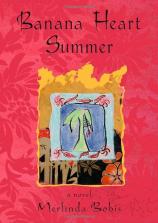Reading Group Guide
Discussion Questions
Banana Heart Summer

1. What do the chapter titles say about the meaning of food in Nenita’s world? What dishes and ingredients are most significant in your life?
2. How do the novel’s three parts reflect three phases of Nenita’s experience during that pivotal summer? What transition is marked as she moves from “The Heart of the Matter” to “The Spleen of the Matter”? Who “becomes a heart” in the final scenes?
3. What does Nana Dora teach Nenita in the beginning of the book, when she shows her how to shred a banana heart, and in the end, telling her that “when you eat the heart of the matter, you’ll never grow hungry again”?
4. “Remedios” is the Spanish word for remedy, or help. How is the map is used throughout the novel, featuring Remedios Street as the pathway between the volcano and the church? What does the map tell us about the way Nenita sees her neighborhood? What do the perils of the volcano and its eventual eruption and the rituals of the church, such as the novena, represent in Nenita’s life?
5. Who has the most power in Nenita’s world? Does language divide or unite her Filipino neighbors and the descendants of Spanish colonizers? Does Manolito’s mestizo identity, combining Spanish and Chinese ancestry, enhance his appeal? As an outsider, does the red-headed Ralph McKenna have an advantage?
6. Nenita tells us that her parents had very different backgrounds. How did this contribute to the tension in the family? How did her mother and father justify their cycle of abuse and remorse?
7. Chapter Eight captures the personalities of two very different men in Nenita’s life–Calcium Man and Manolito. What do they represent to her? What does she discover about the role of men, versus women, in her community?
8. What are the positive and negative effects of working for the Valenzuelas? How does their household compare to the one Nenita had known throughout her childhood?
9. Discuss the many types of hunger described in Banana Heart Summer. How does mastering the chemistry of cooking help Nenita balance other aspects of her life as well?
10. Nenita mentions Mills & Boon romance novels throughout her own tale. Do any of the characters she describes get to live the dramatic, happy outcomes of a Mills & Boon novel?
11. How did the relationships between Nenita and her siblings (particularly Junior) compare to the family you grew up in? How did the anticipation of a new baby, and the tragic outcome that followed, affect Nenita? What did her mother ultimately teach her about being a daughter?
12. Discuss the music that forms a “soundtrack” throughout the novel. What aspects of the 1960s are captured in these songs? Did American and British pop music change the world?
13. Does Nenita’s departure make for a happy ending? How would those decades of her adult life have unfolded if she had remained a servant in her homeland instead?
14. What is unique about the storytelling voice used in Banana Heart Summer? How do the author’s accomplishments as a prize-winning poet, combined with her Filipino-Australian perspective, make this a special book?
15. If your reading group sampled Nenita’s recipes and cooking tips, talk about the experience of preparing and savoring these dishes. Which ones are your favorites? What does cuisine say about a culture?
Banana Heart Summer
- Publication Date: May 20, 2008
- Paperback: 257 pages
- Publisher: Delta
- ISBN-10: 0385341121
- ISBN-13: 9780385341127







